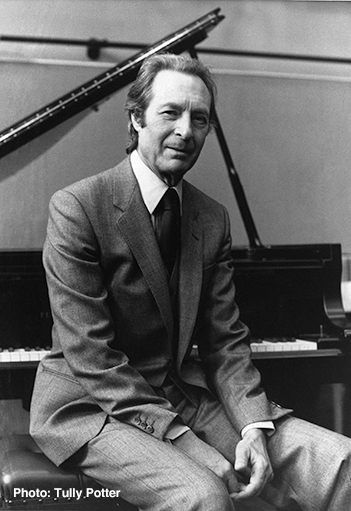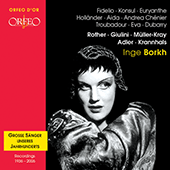Carlo Maria Giulini
Carlo Maria Giulini initially studied the viola with Remy Principe and composition with Alessandro Bustini at the Accademia di Santa Cecilia in Rome, before turning to conducting with Bernardino Molinari. As a student he played in a string quartet, and during the late 1930s was a member of the viola section of the Augusteo Orchestra of Rome, playing under conductors such as Furtwängler, Klemperer, Richard Strauss and Bruno Walter. During World War II he was a member of the Italian army, before going into hiding because of his anti-Fascist beliefs; however with the collapse of Germany in Europe, in 1944 he was chosen to conduct the first concert to celebrate the liberation of Rome, in a programme at the Augusteo featuring Brahms’s Symphony No. 4.
After this, Giulini became the assistant to Fernando Previtali at the Rome Orchestra of Italian Radio, becoming its chief conductor in 1946. He conducted many opera performances for radio and began to appear abroad, at festivals in Prague and Strasbourg. Having made his professional debut in the opera house at Bergamo in 1950 with Verdi’s La traviata, in the same year he formed the Milan Orchestra of Italian Radio, of which he was the first chief conductor. A broadcast performance of Haydn’s Il mondo della luna in 1951 brought him to the attention of Toscanini and de Sabata and he made his debut at La Scala, Milan, the following year with Falla’s opera La vida breve. It was while hearing Giulini conduct rehearsals for this production that Walter Legge offered him a recording contract with his Columbia label of EMI.
When de Sabata relinquished his post as chief conductor at La Scala in 1953, Giulini succeeded him, bringing several notable new productions to its stage, including Bartók’s Bluebeard’s Castle, Monteverdi’s L’incoronazione di Poppea, and the first staged performances in Italy of Stravinsky’s ballet score Les Noces. He developed a close working relationship with the two major stage directors of the period, Luchino Visconti and Franco Zeffirelli, and with Maria Callas, whom he conducted in La traviata, Gluck’s Alceste and Rossini’s Il barbiere di Siviglia. Giulini’s United Kingdom debut took place in 1955, when he conducted the Glyndebourne Festival Opera in Verdi’s Falstaff at the Edinburgh Festival, and his American debut came in the same year, with the Chicago Symphony Orchestra.
Visconti’s legendary production of Verdi’s Don Carlo at Covent Garden (1958), the first night of which was broadcast, established Giulini’s public reputation in the United Kingdom as a conductor of the first rank; and soon afterwards he began to conduct Legge’s Philharmonia Orchestra in concert. Together, and frequently with the Philharmonia Chorus, they gave many notable concerts, producing a steady stream of distinguished recordings. Giulini and Visconti collaborated on two further productions at Covent Garden, both of operas by Verdi: Il trovatore and La traviata. After the latter, Giulini announced his intention of gradually withdrawing from conducting in the opera house, concentrating instead on orchestral work.
Between 1969 and 1978 Giulini was principal guest conductor of the Chicago Symphony Orchestra alongside its chief conductor Georg Solti, and during this period he was also chief conductor of the Vienna Symphony Orchestra (1973–1976). He succeeded Zubin Mehta as chief conductor of the Los Angeles Philharmonic Orchestra in 1978, remaining in this post until 1984. During this period he returned to the world of opera, giving performances of Falstaff in Los Angeles, London and Milan in 1982; the production was also recorded. Prior to his retirement from conducting in public in 1998, he limited himself to concerts and worked with just a few orchestras (the Orchestre de Paris, the Philharmonic Orchestra of La Scala Milan, the Chicago Symphony Orchestra and the Berlin and Los Angeles Philharmonic Orchestras).
At the start of Giulini’s career many saw him as a successor to Toscanini and to a lesser extent the latter’s protégé, Guido Cantelli; but in fact Giulini’s performances were quite different in temperament and style from those of these two distinguished musicians. Giulini’s interpretations were often very expansive in terms of tempi, and frequently possessed the richest of orchestral textures and a wonderful plasticity of phrasing; the undoubted emotional impact of many of his performances came from the gradual but relentless build-up of tension, rather than from the shock of hurricane-like tempi as with Toscanini. Possessed of strong and deep ethical beliefs, Giulini also differed totally from his Italian colleagues in his interaction with orchestral players, commenting for instance: ‘My intention always has been to arrive at human contact without enforcing authority. A musician, after all, is not a military officer. What matters most is human contact. The great mystery of music-making requires real friendship among those who work together. Every member of the orchestra knows I am with him or her in my heart.’
Giulini’s seriousness of purpose shines through in his numerous studio and live recordings, and in the range of his repertoire, which for instance easily encompassed the works of Britten, Bruckner and Mahler, as well as the more expected Italian and operatic composers. His discography is very large, and to his many recordings for EMI may be added those made towards the end of his career for Deutsche Grammophon and Sony/Columbia. Of his many operatic recordings, those made with Walter Legge of two of the Mozart/da Ponte operas, Don Giovanni and Le nozze di Figaro, have well stood the test of time; and the later operatic recordings, for Deutsche Grammophon, which include Falstaff and Il trovatore, are finely observed. Fine as his studio recording for EMI of Don Carlo is, the live recording of his Covent Garden performance has a breadth and vigour that is extraordinary. Giulini’s orchestral recordings for Legge maintained a uniformly high standard, his accounts of music by Brahms with the Philharmonia Orchestra being especially notable. As with the operatic recordings, his later orchestral recordings, such as those of music by Mahler and Bruckner, lean towards the introspective in character. In an interview for the magazine Ricordiana, published in July 1958, Giulini succinctly expressed a key element of his philosophy of performance: ‘I feel people should just listen to the music and that the opinions and details about the interpreter are irrelevant.’
© Naxos Rights International Ltd. — David Patmore (A–Z of Conductors, Naxos 8.558087–90).

















